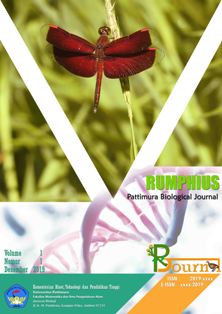ANALYSIS OF VITAMIN C IN TEA POWDER FROM SEAGRASS LEAVES (Enhalus acoroides)
Abstract
The seagrass species Enhalus acoroides is able to live widely, especially on smooth, muddy substrates, but is also able to grow on rocky substrates. It is often found growed together with other types of seagrass, thus forming monospecific vegetation in various habitats. The aim of this research is to determine the amount of vitamin C content made from seagrass leaves. The object in this research was Enhalus acoroides seagrass leaf tea taken from the beach of Suli Village using purposive sampling of 1.5 kg. Seagrass tea is made in the Basic Chemistry Laboratory, Pattimura University. Vitamin C analysis was carried out at the Biochemistry Laboratory, Pattimura University. Vitamin C levels in seagrass leaf tea vary for each repetition or observation sample. In sample code C1, the sample weight (g) is 10.0520, ml Titran(I2) 8.2, Vitamin C (Mg) 7.216 and vitamin C content is 0.071%, for sample code C2 the sample weight (g) is 10, 0740, ml Titran(I2) 10.3, Vitamin C (Mg) 9.064, vitamin C content of 0.090%. Meanwhile, the average amount of vitamin C is 8.14 Mg and has a vitamin C content of 0.08%. The average value of vitamin C is 8.14 Mg, while the amount of vitamin C in seagrass leaves is 0.08%. So it is very possible that Enhalus acoroides seagrass can be used as a new food preparation that is rich in nutritional content.
Downloads
Authors who propose a manuscript and have it approved for publication know that the manuscript will be registered and become part of the RPBJ. Authors and readers understand that this journal is open and all its contents can be accessed freely, provided that RPBJ is still listed as the source of information. The hope is that this journal can become a vehicle for exchange and scientific knowledge for society and the scientific community, especially in the field of Biology and other branches of science.









